2023-2024学年中考专项复习专题5:代词(含解析)
文档属性
| 名称 | 2023-2024学年中考专项复习专题5:代词(含解析) | 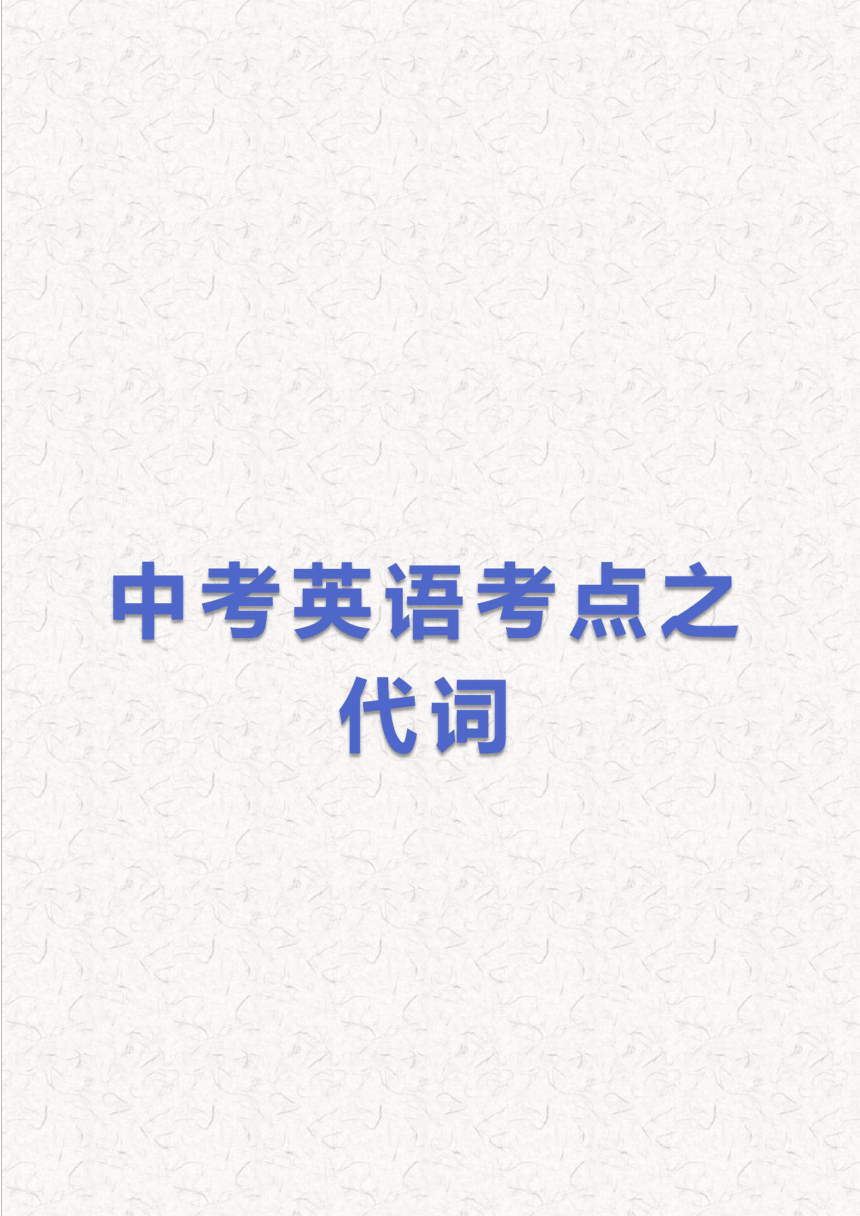 | |
| 格式 | docx | ||
| 文件大小 | 670.5KB | ||
| 资源类型 | 教案 | ||
| 版本资源 | 通用版 | ||
| 科目 | 英语 | ||
| 更新时间 | 2024-06-03 15:48:38 | ||
图片预览

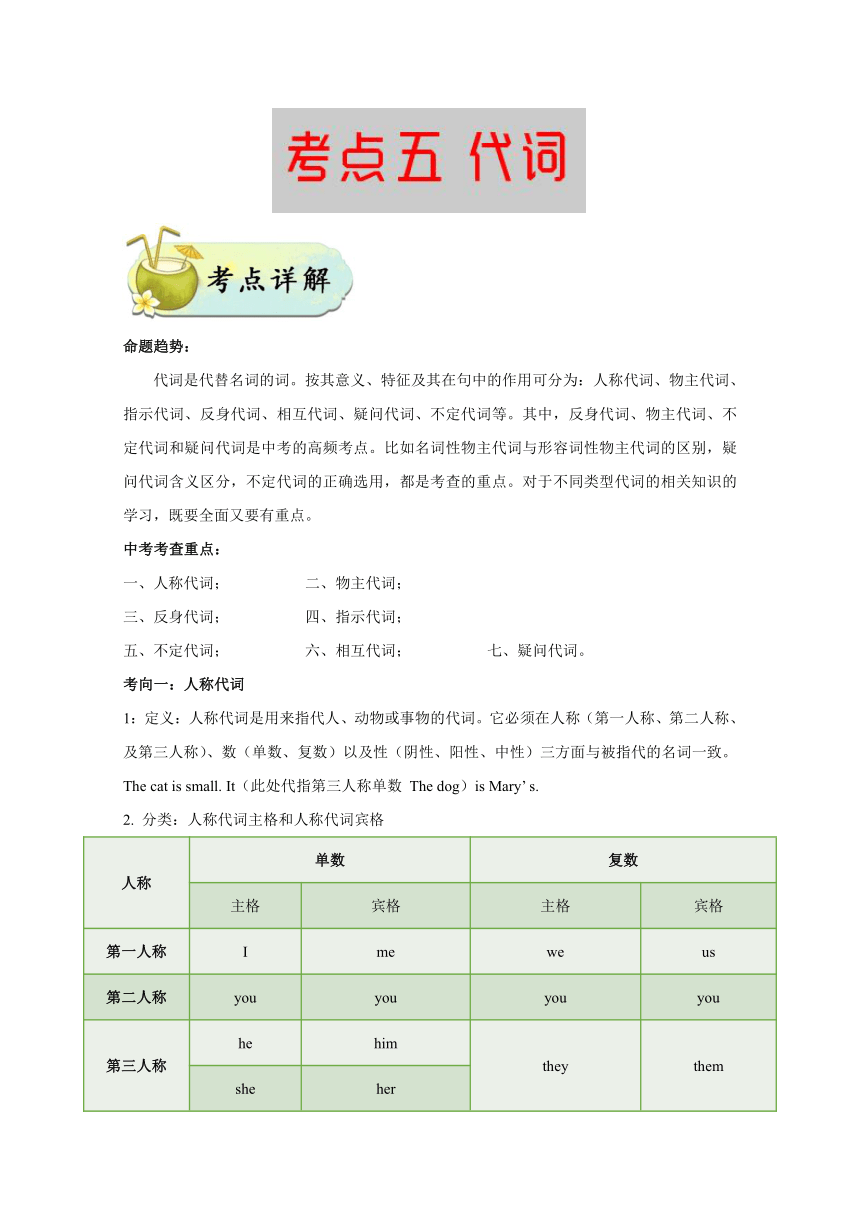
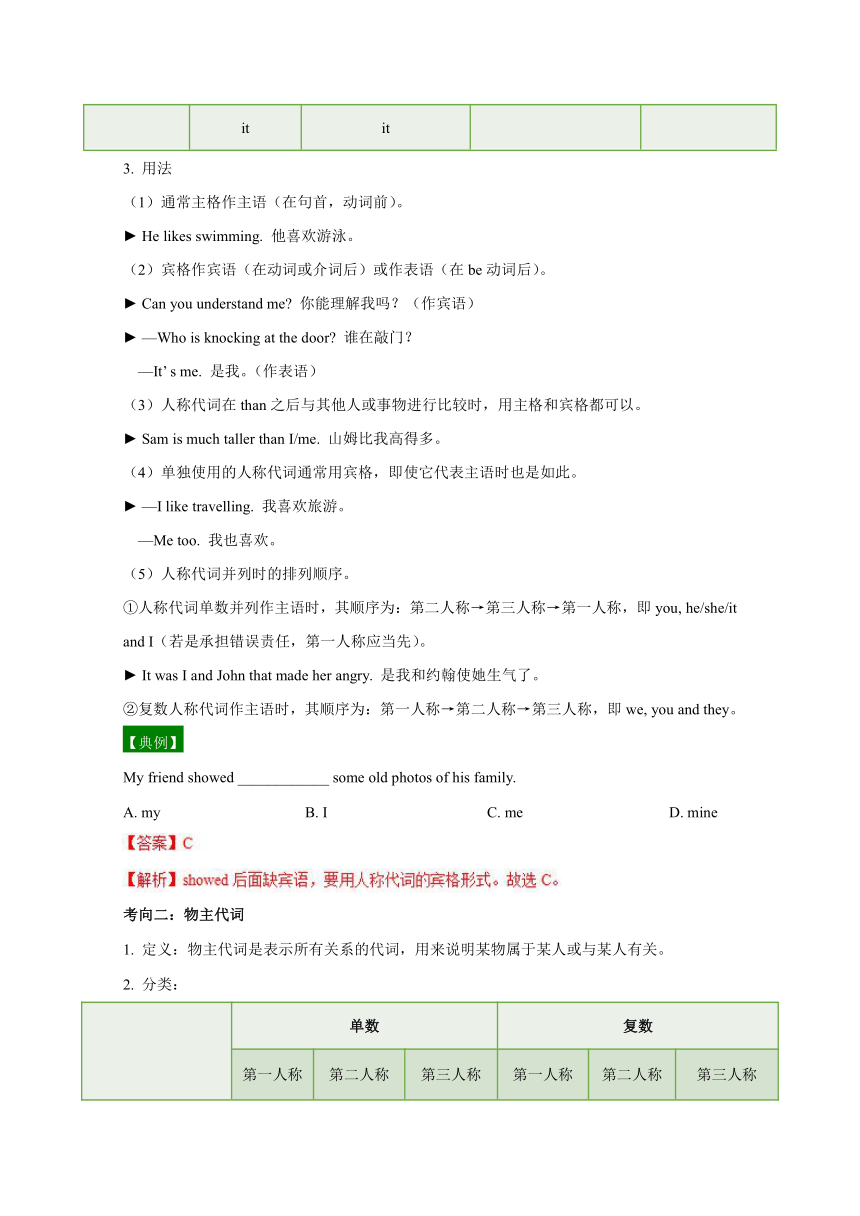
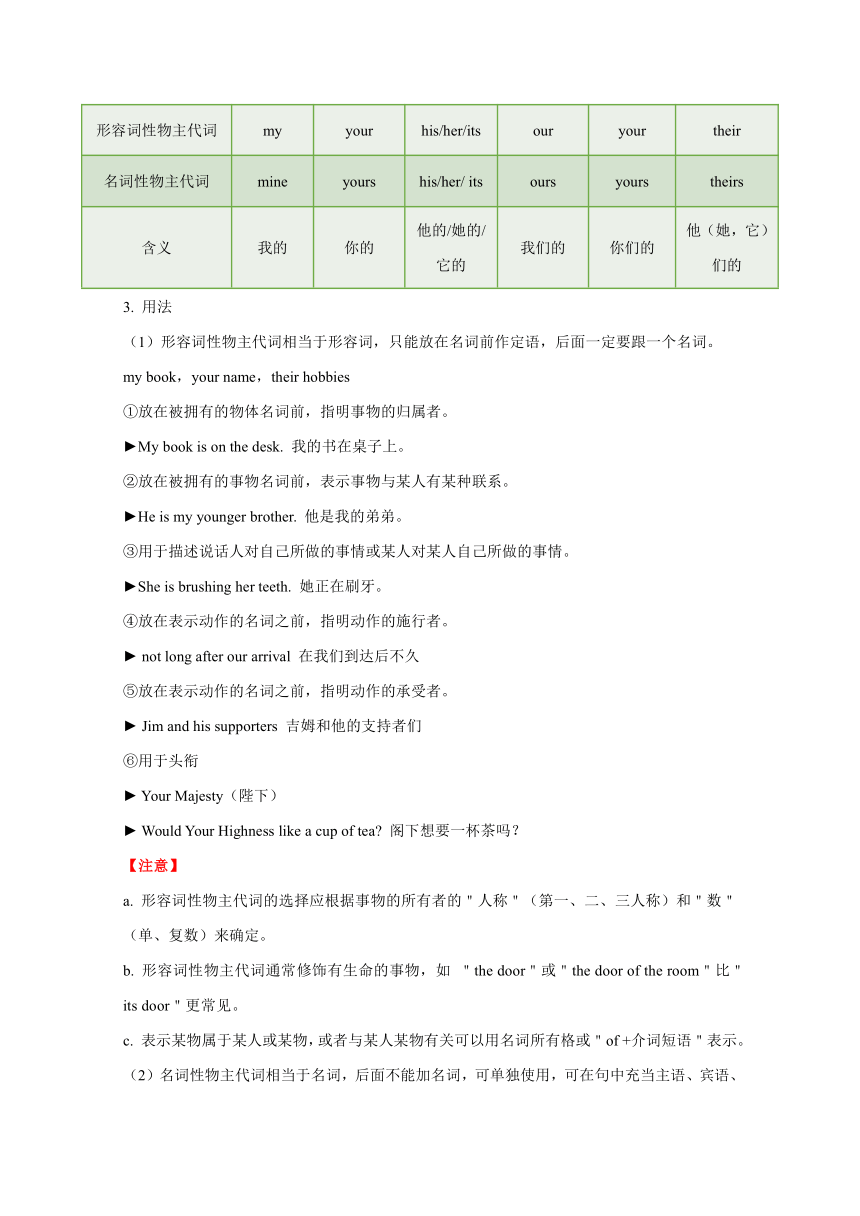
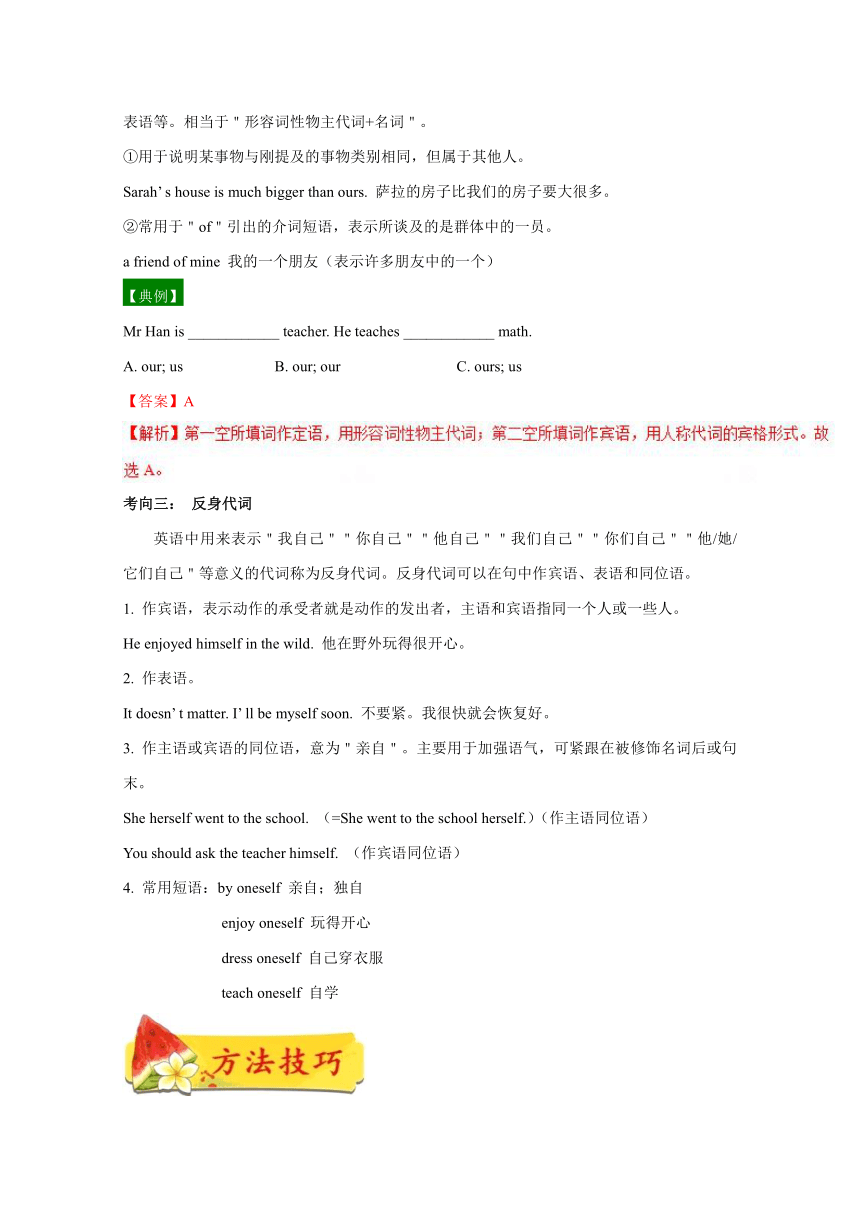
文档简介
命题趋势:
代词是代替名词的词。按其意义、特征及其在句中的作用可分为:人称代词、物主代词、指示代词、反身代词、相互代词、疑问代词、不定代词等。其中,反身代词、物主代词、不定代词和疑问代词是中考的高频考点。比如名词性物主代词与形容词性物主代词的区别,疑问代词含义区分,不定代词的正确选用,都是考查的重点。对于不同类型代词的相关知识的学习,既要全面又要有重点。
中考考查重点:
一、人称代词; 二、物主代词;
三、反身代词; 四、指示代词;
五、不定代词; 六、相互代词; 七、疑问代词。
考向一:人称代词
1:定义:人称代词是用来指代人、动物或事物的代词。它必须在人称(第一人称、第二人称、及第三人称)、数(单数、复数)以及性(阴性、阳性、中性)三方面与被指代的名词一致。
The cat is small. It(此处代指第三人称单数 The dog)is Mary’ s.
2. 分类:人称代词主格和人称代词宾格
人称 单数 复数
主格 宾格 主格 宾格
第一人称 I me we us
第二人称 you you you you
第三人称 he him they them
she her
it it
3. 用法
(1)通常主格作主语(在句首,动词前)。
He likes swimming. 他喜欢游泳。
(2)宾格作宾语(在动词或介词后)或作表语(在be动词后)。
Can you understand me 你能理解我吗?(作宾语)
—Who is knocking at the door 谁在敲门?
—It’ s me. 是我。(作表语)
(3)人称代词在than之后与其他人或事物进行比较时,用主格和宾格都可以。
Sam is much taller than I/me. 山姆比我高得多。
(4)单独使用的人称代词通常用宾格,即使它代表主语时也是如此。
—I like travelling. 我喜欢旅游。
—Me too. 我也喜欢。
(5)人称代词并列时的排列顺序。
①人称代词单数并列作主语时,其顺序为:第二人称→第三人称→第一人称,即you, he/she/it and I(若是承担错误责任,第一人称应当先)。
It was I and John that made her angry. 是我和约翰使她生气了。
②复数人称代词作主语时,其顺序为:第一人称→第二人称→第三人称,即we, you and they。
【典例】
My friend showed ____________ some old photos of his family.
A. my B. I C. me D. mine
考向二:物主代词
1. 定义:物主代词是表示所有关系的代词,用来说明某物属于某人或与某人有关。
2. 分类:
单数 复数
第一人称 第二人称 第三人称 第一人称 第二人称 第三人称
形容词性物主代词 my your his/her/its our your their
名词性物主代词 mine yours his/her/ its ours yours theirs
含义 我的 你的 他的/她的/它的 我们的 你们的 他(她,它)们的
3. 用法
(1)形容词性物主代词相当于形容词,只能放在名词前作定语,后面一定要跟一个名词。
my book,your name,their hobbies
①放在被拥有的物体名词前,指明事物的归属者。
My book is on the desk. 我的书在桌子上。
②放在被拥有的事物名词前,表示事物与某人有某种联系。
He is my younger brother. 他是我的弟弟。
③用于描述说话人对自己所做的事情或某人对某人自己所做的事情。
She is brushing her teeth. 她正在刷牙。
④放在表示动作的名词之前,指明动作的施行者。
not long after our arrival 在我们到达后不久
⑤放在表示动作的名词之前,指明动作的承受者。
Jim and his supporters 吉姆和他的支持者们
⑥用于头衔
Your Majesty(陛下)
Would Your Highness like a cup of tea 阁下想要一杯茶吗?
【注意】
a. 形容词性物主代词的选择应根据事物的所有者的"人称"(第一、二、三人称)和"数"(单、复数)来确定。
b. 形容词性物主代词通常修饰有生命的事物,如 "the door"或"the door of the room"比"its door"更常见。
c. 表示某物属于某人或某物,或者与某人某物有关可以用名词所有格或"of +介词短语"表示。
(2)名词性物主代词相当于名词,后面不能加名词,可单独使用,可在句中充当主语、宾语、表语等。相当于"形容词性物主代词+名词"。
①用于说明某事物与刚提及的事物类别相同,但属于其他人。
Sarah’ s house is much bigger than ours. 萨拉的房子比我们的房子要大很多。
②常用于"of"引出的介词短语,表示所谈及的是群体中的一员。
a friend of mine 我的一个朋友(表示许多朋友中的一个)
【典例】
Mr Han is ____________ teacher. He teaches ____________ math.
A. our; us B. our; our C. ours; us
【答案】A
考向三: 反身代词
英语中用来表示"我自己""你自己""他自己""我们自己""你们自己""他/她/它们自己"等意义的代词称为反身代词。反身代词可以在句中作宾语、表语和同位语。
1. 作宾语,表示动作的承受者就是动作的发出者,主语和宾语指同一个人或一些人。
He enjoyed himself in the wild. 他在野外玩得很开心。
2. 作表语。
It doesn’ t matter. I’ ll be myself soon. 不要紧。我很快就会恢复好。
3. 作主语或宾语的同位语,意为"亲自"。主要用于加强语气,可紧跟在被修饰名词后或句末。
She herself went to the school. (=She went to the school herself.)(作主语同位语)
You should ask the teacher himself. (作宾语同位语)
4. 常用短语:by oneself 亲自;独自
enjoy oneself 玩得开心
dress oneself 自己穿衣服
teach oneself 自学
反身代词用法口诀 反身代词莫乱用,能在句中宾、表、同; 主语、定语不能用,固定搭配要记清。 单数反身代词:myself, yourself, himself, itself; 复数反身代词:ourselves, yourselves, themselves。
【典例】
The boy called his teacher for help because he couldn’ t solve the problem by ____________.
A. herself B. himself C. yourself D. themselves
考向四:指示代词
1. 定义:表示"这个""那个""这些""那些"等指示概念的代词叫指示代词。
指示代词 用法 例句
this(these) 用于指时间或空间上较近的事物 Is this your pen These are my books.
that(those) 用于指时间或空间上较远的事物 That dictionary is Mary’ s. Are those your books
2. 用法
指示代词可在句中作主语、宾语、表语、定语等。
(1)that 和those代替前面提到的东西,以避免重复这个名词。
My seat is next to that of the mayor.(that=mayor’ s seat)我的座位在市长座位旁边。
(2)this 或 that用来回指上文提到的事情,但若要指下文叙述的事情,通常要用 this。
—She is a beautiful girl. 她是一个漂亮的女孩。
—Who said that 那是谁说的?
I want to know this: Is she beautiful 我想知道这一点:她美吗
(3)在打电话时,通常用 this 指自己,用that指对方:
Hello. This is Jim. Is that John 喂,我是吉姆,你是约翰吗?
(4)指示代词this,that和these在作主语时可指物也可指人,但作其他句子成分时只能指物,不能指人。而those作宾语后接定语从句时可以指人。而且只有that、those后面可以跟定语从句。
【典例】
—Hello, Linda speaking. Who’ s ____________
—Hello, this is Martin.
A. he B. one C. that D. this
考向五:不定代词
不明确指代某个人、某个事物、某些人、某些事物的代词叫不定代词。不定代词可以代替名称和形容词,表示不同的数量概念。不定代词没有主格和宾格之分,在句中可作主语、表语、宾语和定语等。
1. 不定代词的句法功能
不定代词 成分
all,both,each,neither,either,much,little,many,few,other,some,any,one 在句中可作主语、宾语、表语和定语
everyone,everybody,everything,someone, somebody,something,anyone,anybody,anything,no one,nobody,nothing,none 在句中可作主语、宾语和表语
every,no 在句中只能作定语
不定代词的基本语法
(1)some、any的用法
用法 例句
some和any作定语时既可以修饰可数名词,又可以修饰不可数名词 Some rice in the bag has been sold out. 袋子里的一些大米已经卖出去了。(修饰不可数名词) Do you have any brothers or sisters 你有兄弟姐妹吗?(修饰可数名词)
some多用于肯定句;在表示请求、劝告、邀请、或不希望对方拒绝的疑问句中用some而不用any Some of the boys are good at swimming. 一些男孩擅长游泳。 Will you give me some water 请给我一些水好吗
any多用于疑问句、否定句和条件状语从句中;用于肯定句中,表示"任何" If you have any questions, please ask me. 如果你有问题,可以问我。 Any child needs love. 任何一个孩子都需要爱。
some和any可以用来修饰单数名词,some表示"某一";any表示"任何的" Any student can answer this question. 任何学生都可以回答这个问题。 Someday Chinese people will fly to the moon. 某天中国人将会飞上月球。
(2)few,a few,little,a little的用法
用法 用于可数名词 用于不可数名词
表示肯定概念 a few虽少,但有几个 a little虽少,但有一点
表示否定概念 few不多,几乎没有 little不多,没有什么
【知识拓展】
1. 这四个词或词组在句中都可作主语、宾语和定语。
Few of us have been to Beijing. 我们中几乎没有人去过北京。(主语)
I know little about the book. 我几乎不知道这本书的内容。(宾语)
There is a little water in the bottle. 瓶子里有一些牛奶。(定语)
He has a few friends. 他有一些朋友。(定语)
2. a little和little也可以用作副词,a little表示"有点,稍微",little表示"很少"。
I’ m a little hungry. 我有点俄。(修饰形容词hungry)
Let him sleep a little. 让他睡一会儿。(修饰动词sleep)
Mary, go a little faster, please. 玛丽,请走快一点儿。(修饰副词比较级)
(3)other,the other,others,the others,another的用法
用法 例句
other 某一个,另一些,其他的。不能单独使用,后面要跟单数名词或复数名词,泛指别的 Where are his other books 他的另一些书在哪里
others 其他。必须单独使用,泛指别人或别的东西,常用于"some... others"结构 Some are red, and others are black. 一些是红的,另一些是黑的。
the other 两个中的另一个,剩下的一个。特指,常用于"one... the other..."结构 She has two sisters — one is a nurse, and the other is a teacher. 她有两个姐姐,一个是护士,另一个是老师。
the others 其他全部,其余的。表示在一个范围内的其他全部 In our class only Tommy is English, and the others are Chinese. 我们班除了汤米是英国人外,其他都是中国人。
another 另一个(指多个中的任何一个),可单独用,也可接单数名词或名词复数,表示"另几个,再几个" You can see another ship in the sea, can’ t you 你能看见另一艘船在海里,不是吗
(4)all,both,none,either,neither的用法
用法 例句
all ①侧重指三者或三者以上"都,全部,一切",在句中可作主语、宾语、表语、定语和同位语; all于否定句时,表示部分否定;表示全部否定使用none。 All the students are on the playground. 所有的学生都在操场上。 Not all books are good.(= All books are not good. 不是所有的书都是好书。
【知识拓展】all作主语,指代人时,谓语动词使用复数形式,指代事情时,谓语动词一般使用单数;作同位语时,all在句中的位置与both相同。 All goes very well. 一切进展非常顺利。
both ①表示"两者都",可以作主语、宾语、定语和同位语; ②用于否定句表示部分否定,全部否定使用neither; ③both... and"两者都,既……又……"。 They both are not workers. 他们两个不都是工人。 Both Carl and Jeff are good at playing football. 卡尔和杰夫都擅长踢足球
【知识拓展】both作主语时,谓语动词使用复数形式;作主语的同位语时,位于be动词、助动词之后,行为动词之前。 Both of them have been to Beijing. 他们两人都去过北京。 They all enjoyed it. 他们都喜欢它。
none ①意为"没有人,没有一个,一点儿也没有,作主语和宾语,不作定语; ②none指代可数名词作主语时,谓语动词用单数或复数形式均可,而指代不可数名词时,谓语动词必须使用单数形式。 None of the books are mine. 这些书都不是我的。 None of the rubbish has been removed. 垃圾一点也没运走。
【易错警示】none与no one的区别:none既可指人,又可指物,而no one意为"没有人",只能用于指人。作主语时,谓语用单数;none可以与of搭配,而no one无此用法;none用于回答how many或how much引出的特殊疑问句,而no one用于回答who引出的特殊疑问句。 —How many students are there in the classroom now 现在教室里有多少学生? —None. 没有一个人。 —Who is in the classroom now 现在谁在教室呢? —No one. 没人。
either ①表示"两者中任何一个",可作主语、宾语和定语; ②either作主语时,谓语动词应使用单数形式;作定语时,修饰单数名词。 You can park on either side of the street. 你在街道的哪边停车都可以。 The two guests have arrived and either is welcome. 两个客人都到了,而且都受欢迎。
【知识拓展】 (1)either可用于搭配"either... or...",意为"或者……或者……;要么……要么……"。 Either he or I am to blame. 或者他或者我将受到责备。 (2)either可作为副词,意为"也",用于否定句的句末。 He won’ t go and I won’ t go either. 他不去,我也不去。
neither ①意为"两者都不",可作主语、宾语和定语; ②neither... nor..."既不……也不……"。 Neither answer is correct. 两个答案都不对。 Neither he nor I am a doctor. 他和我都不是医生。
【易错警示】neither作主语时,谓语动词使用单数形式;作定语时,修饰单数名词。
(5)复合不定代词的用法
由some,any,every,no与one,body,thing一起构成的代词叫复合不定代词,如something,everybody,anyone,nothing等。由one和body构成的复合不定代词可相互换用。
用法 例句
复合不定代词一般用作单数,在句中作主语、宾语或表语 Nobody is aliment. 没有人缺席。(主语) Do you need anything 你需要点什么吗 (宾语) Grammar is not everything. 语法不是全部。(表语)
复合不定代词被定语修饰时,定语须放在它们后面 There is nothing wrong with the radio. 收音机没有什么问题。
由some构成的复合不定代词用法与some类似,而由any构成的复合不定代词用法与any类似。当any构成的复合不定代词用于肯定句时,常表示"无论什么东西,随便什么东西/事情" There’ s always somebody at home in the evenings. 晚上总有人在家。 Is there anything interesting in the newspaper 报纸上有什么有趣的东西吗?
【易错警示】
every day与everyday的区别:
1. every day是名词短语,在句中充当状语,修饰整个句子。
I finish my homework before 9 every day. 我每天九点前完成作业。
2. everyday是形容词,在句中充当定语,修饰名词。
Everyday work makes me bored. 每天的工作让我很烦。
【典例】
—Which of the two magazines will you take
—I’ ll take ____________ though I find ____________ of them are very useful to me.
A. all;both B. either;either C. either;neither D. either;both
【答案】D
【解析】句意:——这两本杂志你要买哪一本?——我将会拿其中一本,尽管我发现这两本(杂志)对我都非常有用。第一空用either,指两本杂志中的任何一本;第二空要用both,指两者都。all指三者或三者以上都。
考向六:疑问代词
用来构成特殊疑问句的代词叫疑问代词。它们一般位于句首。疑问代词包括who、whose、whom、what、which。
代词 用法 例句
Who 表示"谁",可以指代单数和复数名词,在句中作主语、宾语或表语 Who is on duty today 今天谁值日?
Whom 表示"谁",可以指代单数和复数。whom只能作动词的宾语或介词的宾语,不直接跟在介词后时可用who替换,位于介词后作介词宾语时只能用whom To whom you were talking just now 你刚才和谁说话呢 Whom/Who did you often play with when you were a child 小时候你经常和谁玩
Whose 表示"谁的",既可置于名词前作定语,也可单独使用,在句中常作主语、宾语、定语或表语 Whose iPad is this 这是谁的iPad? (定语) Whose is this iPad 这个iPad是谁的? (表语)
Which 表示"哪一个(些)",既可指人也可指物,可指可数名词单、复数,也可指不可数名词,在句中常作主语、宾语或定语 Which animal do you like best 你最喜欢哪种动物 Which is cheaper, this printer or that one 这台打印机和那台打印机,哪台更便宜?
what 表示"什么",可单独使用,也可放在名词前,既可以指代或修饰不可数名词,也可以指代或修饰可数名词的单、复数。在句中充当主语、宾语、表语或定语 What makes you love your hometown so much 是什么使你这么热爱你的家乡?
【易错警示】
which和what的用法辨析
用which提问,指在相当数目的人或物中进行选择,限制在一定的范围内;用what提问,不限制范围。
Which do you like, rice or meat 你喜欢什么,米饭还是肉?
What do you like 你喜欢什么?
【知识拓展】 what的常见用法
1. 用于询问职业:What be+主语 或What do/does/did+主语+ do
What does your father do =What is your father 你父亲是干什么的?
2. 用于询问天气或品行:What be+主语+like
What’ s the weather like 天气怎么样?
3. 用于询问外貌、长相:What do/does/did+主语+look like
What does she look like 她长什么样?
4. 征求对方的意见:What about ...
What about going out for a movie 出去看电影怎么样?
【典例】
—____________ are you going to buy for your father for Father’ s Day
—A T-shirt.
A. What B. When C. Where D. How
1. —Have you found your lost mobile phone
—No, I haven’ t found ____________, but I bought ____________ this morning.
A. one;that B. that;one C. it;one D. one;it
2. She got up to get some sleeping pills but found there was ____________ left at home.
A. nothing B. none C. something D. nobody
3. —Mike, where’ s today’ s newspaper
—Well, you don’ t need to read it because there is ____________ in it.
A. something interesting B. nothing special C. important thing D. anything new
4. —Let’ s go to see a film this weekend, can we go on Saturday or Sunday
—____________ is OK, I’ m not free at weekends.
A. Neither B. Either C. Every D. Each
5. The song I Believe I Can Fly tells us that believing in ____________ is very important.
A. themselves B. itself C. ourselves D. yourselves
6. My dad is my role model. I learn a lot from ____________.
A. it B. him C. her D. them
1. —Nick, I lost my pen and I couldn’ t find ____________ anywhere.
—There are many pens in that box. Just take ____________.
A. it; it B. it; one C. one; it D. one; one
2. Please come in, Alice. Welcome to ____________ house.
A. her B. his C. my D. your
3. —She is too busy to help us finish the work.
—Let’ s do it ____________.
A. herself B. myself C. itself D. ourselves
4. Jack is happy. Ms. Wang, an excellent teacher, teaches ____________ math this term.
A. he B. him C. himself D. his
5. I’ m surprised at the new look of ____________ hometown.
A. I B. me C. my D. mine
6. There are many good teachers in ____________ school.
A. we B. him C. our D. themselves
7. —The sunglasses on your desk are nice. Are they ____________
—Yes, I got them from my parents as a birthday present.
A. yours B. your C. yourself
8. —Do you know the student ____________ got an A in the English exam
—Of course. She is my deskmate, Li Hong
A. who B. whom C. whose
9.—Hi, Sara. Is this ____________ English book
—No. ____________ is on the desk.
A. your;Mine B. your;My C. yours;Mine D. your;My
10.How do you get on with ____________ little brother I’ ve just had a baby sister I’ m worrying about it.
A. my B. his C. her D. your
11.—Sally, there’ s a pen on the floor. Is it yours
—Oh…yes. It’ s ____________. Thank you.
A. mine B. yours C. hers
12.Ladies and gentlemen, attention please! I have ____________ important to tell you.
A. nothing B. something C. everything D. anything
13.Could you record today’ s NBA basketball game for me I can watch ____________ later.
A. one B. my C. your D. it
14.On the way to Mount Heng, the scenery was so beautiful that all of us lost ____________ in it.
A. myself B. themselves C. ourselves
1. Here are my shoes. ____ are under his bed.
A. Their B. Her C. Your D. His
2. I have an elder sister. ___ name is Mary. ___ loves ___ very much.
A. She; Her; me B. Her; She; I C. Her; She; me D. She; She; me
3. Miss Guo asked John if he could solve the problem by _______.
A. he B. him C. his D. himself
4. —John, someone in your class phoned you this morning.
—Oh! Who was __________
A. he B. she C. it D. this
5. When the Greens moved into the house last week, ____was at sixes and sevens, so they did a big cleaning.
A. something B. everything C. anything D. nothing
6. —Shall we meet and discuss the problem at 9 a.m.
—I’ m afraid I will be busy at that time. Let’s make it time.
A. other’s B. the other C. another D. other
7. The stories _______ were written by Mark Twain are often humorous.
A. that B. those C. who D. what
8. Some young people like to play WeChat when they
are free, but ______ like to go to the cinema.
A. others B. the other C. Another
9. —Andy, could I borrow bicycle
— is broken. You can ask Carmen.
A. you; My B. you; Mine C. your; My D. your; Mine
10. —Do you like communicating with your friends on QQ or MSN
—____________. I’ d rather ____________ the mobile phone.
A. Either; use B. Neither; use C. Both; not to use D. Neither; to use
11.I’ m expecting a new mobile for long, but I haven’ t got enough money to buy ____________.
A. it B. one C. this D. that
12. Jane took ____________ look at her house the moment she started her car.
A. other B. others C. another D. the other
13. —Can you work out the two problems
—Let me see, I think I can do ____________ one. They are both easy.
A. either B. neither C. some D. any
14. —Excuse me, could you please tell me the way to the museum
—I’ m sorry. I haven’t been there before. You may ask ____________.
A. somebody else B. else anybody C. else somebody D. anybody else
15. This photo reminds me ____________ the things and persons ____________ we met at college.
A. of; that B. about; which C. to; / D. on; what
【跟踪训练】
1. C 【解析】句意:——你找到你丢失的手机了吗?——没有找到,但是今天上午我买了一个新的。one 表示与上文提到的是一类事物中的某一个,不确定,而it 特指上文的内容。故选C。
3. B 【解析】句意:——迈克,今天的报纸在哪?——你不必阅读,因为里面没有什么特殊的东西。形容词修饰不定代词放在不定代词的后面。故选B。
4. A 【解析】句意:——这周末我们去看电影吧,是周六还是周日去?——哪天都不行。我周末没有空。neither两者都不;either两者之一;every每;each每一个。故选A。
5. C 【解析】句意:歌曲《我相信我会飞》告诉我们相信自己很重要。themselves他们自己;itself它自己;ourselves 我们自己;yourselves 你们自己。根据tells us可知此处是我们要相信我们自己,所以选C。
6. B 【解析】句意:我的爸爸是我的榜样。我从他身上学到了很多东西。it它;him他;her她;them他们。根据本句主语My dad可知选B。
【真题再现】
1. B【解析】句意:——尼克,我的钢笔丢了,到处都找不到它。——那个盒子里有很多钢笔。就拿一个吧。代词it指代前文出现过的名词,特指同一物品;one指代同类名词中的"一,一个"。第一个空指代的就是前面的my pen,应该用it;第二个空表示盒子里的一支钢笔,并不是上面提到的那一个,应该用one,故答案选B。
2. C【解析】句意:爱丽丝请进,欢迎来到我的房子。考查代词辨析题。根据句意语境,可知是"我"在欢迎客人的到来,需用第一人称的my,故选C。
4. B【解析】句意:杰克很高兴,王老师,一个优秀的老师,这学教他数学。A. he 他(主格);B. him他(宾格);C. himself他自己;D. his他的;根据teach sb. sth.教某人做某事,动词后用宾格做宾语;故选B
5. C【解析】句意:我对家乡的新面貌感到惊讶。考查代词辨析题。空格后hometown(故乡)是名词,空格需用形容词性物主代词。I和me分别是人称代词的主格和宾格形式,mine是名词性物主代词,不再接名词,都可排除。my形容词性物主代词,后面需接名词。根据句意语境,可知选C。
6. C【解析】句意:我们学校有很多好老师。A. we人称代词,主格,我们;B. him人称代词,宾格,他;
C. our形容词性物主代词,我们的;D. themselves反身代词,他们自己。由空格后面的名词school,可知此处应填形容词性物主代词,用来修饰后面的名词school,结合选项,可知C选项符合题意,故答案选C。
7. A【解析】句意:——你桌子上的太阳镜很好看。它们是你的吗?——是的,我从父母那里得到了生日礼物。考查物主代词辨析题。空格后面没有名词,需用名词性物主代词作表语;your是形容词性物主代词,yourself是反身代词,都可排除。根据句意语境,可知选A。
8. A【解析】句意:——你认识在英语考试中得A的那个学生吗?——当然,她是我同桌,李红。这是定语从句结构,先行词是the student,引导词在从句中作主语,所以用who;故选A。
9. A 【解析】句意:——你好,萨拉。这是你的英语书吗?——不。我的在书桌上。两空都表示"某人的",用物主代词,前空后有名词English book,用形容词性物主代词;后空后无名词,用名词性物主代词。故选A。
10. D 【解析】句意:你和你的弟弟相处得怎么样?我刚有一个小妹妹,我在担心着。A. my我的;B. his他的;C. her她的;D. your你的。"你"和"你的"弟弟相处得如何?故选D。
11. A 【解析】句意:——萨利,在地板上有一支钢笔。它是你的吗?——哦……是的。它是我的。谢谢你。A.我的;B.你的;C.她的。故选A。
13. D 【解析】句意:你能为我录下今天的篮球比赛吗?我可以稍后看它。此处指代上文中的today’ s NBA basketball game,用it代替。故选D。
14. C 【解析】句意:在去衡山的路上,风景是如此的美,以至于我们都被迷在其中了。A. myself我自己;B. themselves他们自己;C. ourselves我们自己。风景迷人,我们把我们自己沉迷其中了。故选C。
【模拟检测】
1. D【解析】句意:这是我的鞋子。他的在床底下。A. Their形容词性物主代词,他们的;B. Her形容词性物主代词, 她的;C. Your形容词性物主代词,你的;D. His既作形容词性物主代词,又作名词性物主代词,他的。名词性物主代词可以单独使用,而形容词性物主代词+名词。故选D。
2. C【解析】句意:我有一个姐姐。她的名字是Mary。她非常爱我。我的姐姐是女性,形容词性的物主代词用her,人称代词用she,love后跟代词的宾格。故选C。
3. D【解析】句意:郭小姐问约翰是否他能独立解决问题。by oneself独立地,故选D。
4. C【解析】句意:——约翰,今天早上你班上有人打电话给你。——哦,是谁呢? 当指心目中的一个人,而不关注这个人的性别、年龄等情况时,通常使用人称代词it指代。故选C。
5. B【解析】考查不定代词。句意:当Greens全家上周搬到房子的时候,所有东西都乱七八糟的,所以他们做了大扫除。Something一些东西, everything每件事物,所有;anything任何东西;nothing没什么东西。
6. C【解析】句意:——我们在9点碰面讨论这个问题好吗?——恐怕那个时候我会比较忙,让我们定另外一个时间吧。other’ s形式错误;the other表示两者中的另一个;another另一个;other其他的,是形容词,修饰名词。根据句意可知,说话人的意思是早上9点这个时间不合适,再换另一个时间,泛指另一个,故应选C。
7. A【解析】考查关系代词。句意:Mark Twain写的那些故事常常是非常幽默的。that关系代词,先行词可以是人或物;those 那些;who谁,引导定语从句时,先行词是人;what什么,不能引导定语从句。根据句意可知,这里考查的是定语从句,先行词是stories,故选A。
8. A【解析】考查代词的用法。句意:一些人当他们有空的时候,喜欢玩微信,但是其他的人喜欢去看电影。Others表示其他的人们;B. the other表示两者中的另一个;C. Another另一个;结合语境,故选A。
10. B 【解析】考查代词和非谓语动词。句意:——你喜欢用QQ还是MSN和你的朋友聊天?——都不喜欢,我宁愿用手机打电话。根据语境,要用否定的回答,用neither两者都不;either要么;both两者都。would rather do sth.宁愿做某事;故选B。
11. B 【解析】句意:我期望一部新手机很长时间,但是我没有足够的钱买一个。此处代指a new mobile,故用代词one。故选B。
12. C 【解析】句意:简发动汽车的时候,又看了一眼她的房子。A. other其他的,形容词;B. others 其他的,代词,相当于other+名词;C. another又一次,又一个;D. the other另一个(两个中的);剩余的。结合句意和语境可知选C。
13. A 【解析】句意:——你能计算出这两个问题吗?——让我想想,我想我能做出任何一个,他们都很容易。either两者中任何一个;neither两者都不;some一些,用于肯定句中;any一些,用于否定句或者疑问句中。根据句意They are both easy可知,这两个问题任何一个都会做,故选A。
14. A 【解析】句意:——对不起,请问你可以告诉我去博物馆的路吗?——对不起,我以前没有去过那儿。你可以问其他人。some的复合不定代词一般用在肯定句里,any的复合不定代词一般用在否定句和疑问句里。本句是肯定句,用somebody。形容词修饰不定代词时,要放在不定代词之后。故选A。
15. A 【解析】考查定语从句。句意:这张相片使我想起了我在大学时遇到过的人和事。前空是固定结构:remind sb. of…使某人想起……;提醒某人……;后面的the things and persons是先行词,后面跟的是定语从句,先行词在定语从句中作宾语,用关系代词,既有人,也有物时,关系词用that。故选A。
代词是代替名词的词。按其意义、特征及其在句中的作用可分为:人称代词、物主代词、指示代词、反身代词、相互代词、疑问代词、不定代词等。其中,反身代词、物主代词、不定代词和疑问代词是中考的高频考点。比如名词性物主代词与形容词性物主代词的区别,疑问代词含义区分,不定代词的正确选用,都是考查的重点。对于不同类型代词的相关知识的学习,既要全面又要有重点。
中考考查重点:
一、人称代词; 二、物主代词;
三、反身代词; 四、指示代词;
五、不定代词; 六、相互代词; 七、疑问代词。
考向一:人称代词
1:定义:人称代词是用来指代人、动物或事物的代词。它必须在人称(第一人称、第二人称、及第三人称)、数(单数、复数)以及性(阴性、阳性、中性)三方面与被指代的名词一致。
The cat is small. It(此处代指第三人称单数 The dog)is Mary’ s.
2. 分类:人称代词主格和人称代词宾格
人称 单数 复数
主格 宾格 主格 宾格
第一人称 I me we us
第二人称 you you you you
第三人称 he him they them
she her
it it
3. 用法
(1)通常主格作主语(在句首,动词前)。
He likes swimming. 他喜欢游泳。
(2)宾格作宾语(在动词或介词后)或作表语(在be动词后)。
Can you understand me 你能理解我吗?(作宾语)
—Who is knocking at the door 谁在敲门?
—It’ s me. 是我。(作表语)
(3)人称代词在than之后与其他人或事物进行比较时,用主格和宾格都可以。
Sam is much taller than I/me. 山姆比我高得多。
(4)单独使用的人称代词通常用宾格,即使它代表主语时也是如此。
—I like travelling. 我喜欢旅游。
—Me too. 我也喜欢。
(5)人称代词并列时的排列顺序。
①人称代词单数并列作主语时,其顺序为:第二人称→第三人称→第一人称,即you, he/she/it and I(若是承担错误责任,第一人称应当先)。
It was I and John that made her angry. 是我和约翰使她生气了。
②复数人称代词作主语时,其顺序为:第一人称→第二人称→第三人称,即we, you and they。
【典例】
My friend showed ____________ some old photos of his family.
A. my B. I C. me D. mine
考向二:物主代词
1. 定义:物主代词是表示所有关系的代词,用来说明某物属于某人或与某人有关。
2. 分类:
单数 复数
第一人称 第二人称 第三人称 第一人称 第二人称 第三人称
形容词性物主代词 my your his/her/its our your their
名词性物主代词 mine yours his/her/ its ours yours theirs
含义 我的 你的 他的/她的/它的 我们的 你们的 他(她,它)们的
3. 用法
(1)形容词性物主代词相当于形容词,只能放在名词前作定语,后面一定要跟一个名词。
my book,your name,their hobbies
①放在被拥有的物体名词前,指明事物的归属者。
My book is on the desk. 我的书在桌子上。
②放在被拥有的事物名词前,表示事物与某人有某种联系。
He is my younger brother. 他是我的弟弟。
③用于描述说话人对自己所做的事情或某人对某人自己所做的事情。
She is brushing her teeth. 她正在刷牙。
④放在表示动作的名词之前,指明动作的施行者。
not long after our arrival 在我们到达后不久
⑤放在表示动作的名词之前,指明动作的承受者。
Jim and his supporters 吉姆和他的支持者们
⑥用于头衔
Your Majesty(陛下)
Would Your Highness like a cup of tea 阁下想要一杯茶吗?
【注意】
a. 形容词性物主代词的选择应根据事物的所有者的"人称"(第一、二、三人称)和"数"(单、复数)来确定。
b. 形容词性物主代词通常修饰有生命的事物,如 "the door"或"the door of the room"比"its door"更常见。
c. 表示某物属于某人或某物,或者与某人某物有关可以用名词所有格或"of +介词短语"表示。
(2)名词性物主代词相当于名词,后面不能加名词,可单独使用,可在句中充当主语、宾语、表语等。相当于"形容词性物主代词+名词"。
①用于说明某事物与刚提及的事物类别相同,但属于其他人。
Sarah’ s house is much bigger than ours. 萨拉的房子比我们的房子要大很多。
②常用于"of"引出的介词短语,表示所谈及的是群体中的一员。
a friend of mine 我的一个朋友(表示许多朋友中的一个)
【典例】
Mr Han is ____________ teacher. He teaches ____________ math.
A. our; us B. our; our C. ours; us
【答案】A
考向三: 反身代词
英语中用来表示"我自己""你自己""他自己""我们自己""你们自己""他/她/它们自己"等意义的代词称为反身代词。反身代词可以在句中作宾语、表语和同位语。
1. 作宾语,表示动作的承受者就是动作的发出者,主语和宾语指同一个人或一些人。
He enjoyed himself in the wild. 他在野外玩得很开心。
2. 作表语。
It doesn’ t matter. I’ ll be myself soon. 不要紧。我很快就会恢复好。
3. 作主语或宾语的同位语,意为"亲自"。主要用于加强语气,可紧跟在被修饰名词后或句末。
She herself went to the school. (=She went to the school herself.)(作主语同位语)
You should ask the teacher himself. (作宾语同位语)
4. 常用短语:by oneself 亲自;独自
enjoy oneself 玩得开心
dress oneself 自己穿衣服
teach oneself 自学
反身代词用法口诀 反身代词莫乱用,能在句中宾、表、同; 主语、定语不能用,固定搭配要记清。 单数反身代词:myself, yourself, himself, itself; 复数反身代词:ourselves, yourselves, themselves。
【典例】
The boy called his teacher for help because he couldn’ t solve the problem by ____________.
A. herself B. himself C. yourself D. themselves
考向四:指示代词
1. 定义:表示"这个""那个""这些""那些"等指示概念的代词叫指示代词。
指示代词 用法 例句
this(these) 用于指时间或空间上较近的事物 Is this your pen These are my books.
that(those) 用于指时间或空间上较远的事物 That dictionary is Mary’ s. Are those your books
2. 用法
指示代词可在句中作主语、宾语、表语、定语等。
(1)that 和those代替前面提到的东西,以避免重复这个名词。
My seat is next to that of the mayor.(that=mayor’ s seat)我的座位在市长座位旁边。
(2)this 或 that用来回指上文提到的事情,但若要指下文叙述的事情,通常要用 this。
—She is a beautiful girl. 她是一个漂亮的女孩。
—Who said that 那是谁说的?
I want to know this: Is she beautiful 我想知道这一点:她美吗
(3)在打电话时,通常用 this 指自己,用that指对方:
Hello. This is Jim. Is that John 喂,我是吉姆,你是约翰吗?
(4)指示代词this,that和these在作主语时可指物也可指人,但作其他句子成分时只能指物,不能指人。而those作宾语后接定语从句时可以指人。而且只有that、those后面可以跟定语从句。
【典例】
—Hello, Linda speaking. Who’ s ____________
—Hello, this is Martin.
A. he B. one C. that D. this
考向五:不定代词
不明确指代某个人、某个事物、某些人、某些事物的代词叫不定代词。不定代词可以代替名称和形容词,表示不同的数量概念。不定代词没有主格和宾格之分,在句中可作主语、表语、宾语和定语等。
1. 不定代词的句法功能
不定代词 成分
all,both,each,neither,either,much,little,many,few,other,some,any,one 在句中可作主语、宾语、表语和定语
everyone,everybody,everything,someone, somebody,something,anyone,anybody,anything,no one,nobody,nothing,none 在句中可作主语、宾语和表语
every,no 在句中只能作定语
不定代词的基本语法
(1)some、any的用法
用法 例句
some和any作定语时既可以修饰可数名词,又可以修饰不可数名词 Some rice in the bag has been sold out. 袋子里的一些大米已经卖出去了。(修饰不可数名词) Do you have any brothers or sisters 你有兄弟姐妹吗?(修饰可数名词)
some多用于肯定句;在表示请求、劝告、邀请、或不希望对方拒绝的疑问句中用some而不用any Some of the boys are good at swimming. 一些男孩擅长游泳。 Will you give me some water 请给我一些水好吗
any多用于疑问句、否定句和条件状语从句中;用于肯定句中,表示"任何" If you have any questions, please ask me. 如果你有问题,可以问我。 Any child needs love. 任何一个孩子都需要爱。
some和any可以用来修饰单数名词,some表示"某一";any表示"任何的" Any student can answer this question. 任何学生都可以回答这个问题。 Someday Chinese people will fly to the moon. 某天中国人将会飞上月球。
(2)few,a few,little,a little的用法
用法 用于可数名词 用于不可数名词
表示肯定概念 a few虽少,但有几个 a little虽少,但有一点
表示否定概念 few不多,几乎没有 little不多,没有什么
【知识拓展】
1. 这四个词或词组在句中都可作主语、宾语和定语。
Few of us have been to Beijing. 我们中几乎没有人去过北京。(主语)
I know little about the book. 我几乎不知道这本书的内容。(宾语)
There is a little water in the bottle. 瓶子里有一些牛奶。(定语)
He has a few friends. 他有一些朋友。(定语)
2. a little和little也可以用作副词,a little表示"有点,稍微",little表示"很少"。
I’ m a little hungry. 我有点俄。(修饰形容词hungry)
Let him sleep a little. 让他睡一会儿。(修饰动词sleep)
Mary, go a little faster, please. 玛丽,请走快一点儿。(修饰副词比较级)
(3)other,the other,others,the others,another的用法
用法 例句
other 某一个,另一些,其他的。不能单独使用,后面要跟单数名词或复数名词,泛指别的 Where are his other books 他的另一些书在哪里
others 其他。必须单独使用,泛指别人或别的东西,常用于"some... others"结构 Some are red, and others are black. 一些是红的,另一些是黑的。
the other 两个中的另一个,剩下的一个。特指,常用于"one... the other..."结构 She has two sisters — one is a nurse, and the other is a teacher. 她有两个姐姐,一个是护士,另一个是老师。
the others 其他全部,其余的。表示在一个范围内的其他全部 In our class only Tommy is English, and the others are Chinese. 我们班除了汤米是英国人外,其他都是中国人。
another 另一个(指多个中的任何一个),可单独用,也可接单数名词或名词复数,表示"另几个,再几个" You can see another ship in the sea, can’ t you 你能看见另一艘船在海里,不是吗
(4)all,both,none,either,neither的用法
用法 例句
all ①侧重指三者或三者以上"都,全部,一切",在句中可作主语、宾语、表语、定语和同位语; all于否定句时,表示部分否定;表示全部否定使用none。 All the students are on the playground. 所有的学生都在操场上。 Not all books are good.(= All books are not good. 不是所有的书都是好书。
【知识拓展】all作主语,指代人时,谓语动词使用复数形式,指代事情时,谓语动词一般使用单数;作同位语时,all在句中的位置与both相同。 All goes very well. 一切进展非常顺利。
both ①表示"两者都",可以作主语、宾语、定语和同位语; ②用于否定句表示部分否定,全部否定使用neither; ③both... and"两者都,既……又……"。 They both are not workers. 他们两个不都是工人。 Both Carl and Jeff are good at playing football. 卡尔和杰夫都擅长踢足球
【知识拓展】both作主语时,谓语动词使用复数形式;作主语的同位语时,位于be动词、助动词之后,行为动词之前。 Both of them have been to Beijing. 他们两人都去过北京。 They all enjoyed it. 他们都喜欢它。
none ①意为"没有人,没有一个,一点儿也没有,作主语和宾语,不作定语; ②none指代可数名词作主语时,谓语动词用单数或复数形式均可,而指代不可数名词时,谓语动词必须使用单数形式。 None of the books are mine. 这些书都不是我的。 None of the rubbish has been removed. 垃圾一点也没运走。
【易错警示】none与no one的区别:none既可指人,又可指物,而no one意为"没有人",只能用于指人。作主语时,谓语用单数;none可以与of搭配,而no one无此用法;none用于回答how many或how much引出的特殊疑问句,而no one用于回答who引出的特殊疑问句。 —How many students are there in the classroom now 现在教室里有多少学生? —None. 没有一个人。 —Who is in the classroom now 现在谁在教室呢? —No one. 没人。
either ①表示"两者中任何一个",可作主语、宾语和定语; ②either作主语时,谓语动词应使用单数形式;作定语时,修饰单数名词。 You can park on either side of the street. 你在街道的哪边停车都可以。 The two guests have arrived and either is welcome. 两个客人都到了,而且都受欢迎。
【知识拓展】 (1)either可用于搭配"either... or...",意为"或者……或者……;要么……要么……"。 Either he or I am to blame. 或者他或者我将受到责备。 (2)either可作为副词,意为"也",用于否定句的句末。 He won’ t go and I won’ t go either. 他不去,我也不去。
neither ①意为"两者都不",可作主语、宾语和定语; ②neither... nor..."既不……也不……"。 Neither answer is correct. 两个答案都不对。 Neither he nor I am a doctor. 他和我都不是医生。
【易错警示】neither作主语时,谓语动词使用单数形式;作定语时,修饰单数名词。
(5)复合不定代词的用法
由some,any,every,no与one,body,thing一起构成的代词叫复合不定代词,如something,everybody,anyone,nothing等。由one和body构成的复合不定代词可相互换用。
用法 例句
复合不定代词一般用作单数,在句中作主语、宾语或表语 Nobody is aliment. 没有人缺席。(主语) Do you need anything 你需要点什么吗 (宾语) Grammar is not everything. 语法不是全部。(表语)
复合不定代词被定语修饰时,定语须放在它们后面 There is nothing wrong with the radio. 收音机没有什么问题。
由some构成的复合不定代词用法与some类似,而由any构成的复合不定代词用法与any类似。当any构成的复合不定代词用于肯定句时,常表示"无论什么东西,随便什么东西/事情" There’ s always somebody at home in the evenings. 晚上总有人在家。 Is there anything interesting in the newspaper 报纸上有什么有趣的东西吗?
【易错警示】
every day与everyday的区别:
1. every day是名词短语,在句中充当状语,修饰整个句子。
I finish my homework before 9 every day. 我每天九点前完成作业。
2. everyday是形容词,在句中充当定语,修饰名词。
Everyday work makes me bored. 每天的工作让我很烦。
【典例】
—Which of the two magazines will you take
—I’ ll take ____________ though I find ____________ of them are very useful to me.
A. all;both B. either;either C. either;neither D. either;both
【答案】D
【解析】句意:——这两本杂志你要买哪一本?——我将会拿其中一本,尽管我发现这两本(杂志)对我都非常有用。第一空用either,指两本杂志中的任何一本;第二空要用both,指两者都。all指三者或三者以上都。
考向六:疑问代词
用来构成特殊疑问句的代词叫疑问代词。它们一般位于句首。疑问代词包括who、whose、whom、what、which。
代词 用法 例句
Who 表示"谁",可以指代单数和复数名词,在句中作主语、宾语或表语 Who is on duty today 今天谁值日?
Whom 表示"谁",可以指代单数和复数。whom只能作动词的宾语或介词的宾语,不直接跟在介词后时可用who替换,位于介词后作介词宾语时只能用whom To whom you were talking just now 你刚才和谁说话呢 Whom/Who did you often play with when you were a child 小时候你经常和谁玩
Whose 表示"谁的",既可置于名词前作定语,也可单独使用,在句中常作主语、宾语、定语或表语 Whose iPad is this 这是谁的iPad? (定语) Whose is this iPad 这个iPad是谁的? (表语)
Which 表示"哪一个(些)",既可指人也可指物,可指可数名词单、复数,也可指不可数名词,在句中常作主语、宾语或定语 Which animal do you like best 你最喜欢哪种动物 Which is cheaper, this printer or that one 这台打印机和那台打印机,哪台更便宜?
what 表示"什么",可单独使用,也可放在名词前,既可以指代或修饰不可数名词,也可以指代或修饰可数名词的单、复数。在句中充当主语、宾语、表语或定语 What makes you love your hometown so much 是什么使你这么热爱你的家乡?
【易错警示】
which和what的用法辨析
用which提问,指在相当数目的人或物中进行选择,限制在一定的范围内;用what提问,不限制范围。
Which do you like, rice or meat 你喜欢什么,米饭还是肉?
What do you like 你喜欢什么?
【知识拓展】 what的常见用法
1. 用于询问职业:What be+主语 或What do/does/did+主语+ do
What does your father do =What is your father 你父亲是干什么的?
2. 用于询问天气或品行:What be+主语+like
What’ s the weather like 天气怎么样?
3. 用于询问外貌、长相:What do/does/did+主语+look like
What does she look like 她长什么样?
4. 征求对方的意见:What about ...
What about going out for a movie 出去看电影怎么样?
【典例】
—____________ are you going to buy for your father for Father’ s Day
—A T-shirt.
A. What B. When C. Where D. How
1. —Have you found your lost mobile phone
—No, I haven’ t found ____________, but I bought ____________ this morning.
A. one;that B. that;one C. it;one D. one;it
2. She got up to get some sleeping pills but found there was ____________ left at home.
A. nothing B. none C. something D. nobody
3. —Mike, where’ s today’ s newspaper
—Well, you don’ t need to read it because there is ____________ in it.
A. something interesting B. nothing special C. important thing D. anything new
4. —Let’ s go to see a film this weekend, can we go on Saturday or Sunday
—____________ is OK, I’ m not free at weekends.
A. Neither B. Either C. Every D. Each
5. The song I Believe I Can Fly tells us that believing in ____________ is very important.
A. themselves B. itself C. ourselves D. yourselves
6. My dad is my role model. I learn a lot from ____________.
A. it B. him C. her D. them
1. —Nick, I lost my pen and I couldn’ t find ____________ anywhere.
—There are many pens in that box. Just take ____________.
A. it; it B. it; one C. one; it D. one; one
2. Please come in, Alice. Welcome to ____________ house.
A. her B. his C. my D. your
3. —She is too busy to help us finish the work.
—Let’ s do it ____________.
A. herself B. myself C. itself D. ourselves
4. Jack is happy. Ms. Wang, an excellent teacher, teaches ____________ math this term.
A. he B. him C. himself D. his
5. I’ m surprised at the new look of ____________ hometown.
A. I B. me C. my D. mine
6. There are many good teachers in ____________ school.
A. we B. him C. our D. themselves
7. —The sunglasses on your desk are nice. Are they ____________
—Yes, I got them from my parents as a birthday present.
A. yours B. your C. yourself
8. —Do you know the student ____________ got an A in the English exam
—Of course. She is my deskmate, Li Hong
A. who B. whom C. whose
9.—Hi, Sara. Is this ____________ English book
—No. ____________ is on the desk.
A. your;Mine B. your;My C. yours;Mine D. your;My
10.How do you get on with ____________ little brother I’ ve just had a baby sister I’ m worrying about it.
A. my B. his C. her D. your
11.—Sally, there’ s a pen on the floor. Is it yours
—Oh…yes. It’ s ____________. Thank you.
A. mine B. yours C. hers
12.Ladies and gentlemen, attention please! I have ____________ important to tell you.
A. nothing B. something C. everything D. anything
13.Could you record today’ s NBA basketball game for me I can watch ____________ later.
A. one B. my C. your D. it
14.On the way to Mount Heng, the scenery was so beautiful that all of us lost ____________ in it.
A. myself B. themselves C. ourselves
1. Here are my shoes. ____ are under his bed.
A. Their B. Her C. Your D. His
2. I have an elder sister. ___ name is Mary. ___ loves ___ very much.
A. She; Her; me B. Her; She; I C. Her; She; me D. She; She; me
3. Miss Guo asked John if he could solve the problem by _______.
A. he B. him C. his D. himself
4. —John, someone in your class phoned you this morning.
—Oh! Who was __________
A. he B. she C. it D. this
5. When the Greens moved into the house last week, ____was at sixes and sevens, so they did a big cleaning.
A. something B. everything C. anything D. nothing
6. —Shall we meet and discuss the problem at 9 a.m.
—I’ m afraid I will be busy at that time. Let’s make it time.
A. other’s B. the other C. another D. other
7. The stories _______ were written by Mark Twain are often humorous.
A. that B. those C. who D. what
8. Some young people like to play WeChat when they
are free, but ______ like to go to the cinema.
A. others B. the other C. Another
9. —Andy, could I borrow bicycle
— is broken. You can ask Carmen.
A. you; My B. you; Mine C. your; My D. your; Mine
10. —Do you like communicating with your friends on QQ or MSN
—____________. I’ d rather ____________ the mobile phone.
A. Either; use B. Neither; use C. Both; not to use D. Neither; to use
11.I’ m expecting a new mobile for long, but I haven’ t got enough money to buy ____________.
A. it B. one C. this D. that
12. Jane took ____________ look at her house the moment she started her car.
A. other B. others C. another D. the other
13. —Can you work out the two problems
—Let me see, I think I can do ____________ one. They are both easy.
A. either B. neither C. some D. any
14. —Excuse me, could you please tell me the way to the museum
—I’ m sorry. I haven’t been there before. You may ask ____________.
A. somebody else B. else anybody C. else somebody D. anybody else
15. This photo reminds me ____________ the things and persons ____________ we met at college.
A. of; that B. about; which C. to; / D. on; what
【跟踪训练】
1. C 【解析】句意:——你找到你丢失的手机了吗?——没有找到,但是今天上午我买了一个新的。one 表示与上文提到的是一类事物中的某一个,不确定,而it 特指上文的内容。故选C。
3. B 【解析】句意:——迈克,今天的报纸在哪?——你不必阅读,因为里面没有什么特殊的东西。形容词修饰不定代词放在不定代词的后面。故选B。
4. A 【解析】句意:——这周末我们去看电影吧,是周六还是周日去?——哪天都不行。我周末没有空。neither两者都不;either两者之一;every每;each每一个。故选A。
5. C 【解析】句意:歌曲《我相信我会飞》告诉我们相信自己很重要。themselves他们自己;itself它自己;ourselves 我们自己;yourselves 你们自己。根据tells us可知此处是我们要相信我们自己,所以选C。
6. B 【解析】句意:我的爸爸是我的榜样。我从他身上学到了很多东西。it它;him他;her她;them他们。根据本句主语My dad可知选B。
【真题再现】
1. B【解析】句意:——尼克,我的钢笔丢了,到处都找不到它。——那个盒子里有很多钢笔。就拿一个吧。代词it指代前文出现过的名词,特指同一物品;one指代同类名词中的"一,一个"。第一个空指代的就是前面的my pen,应该用it;第二个空表示盒子里的一支钢笔,并不是上面提到的那一个,应该用one,故答案选B。
2. C【解析】句意:爱丽丝请进,欢迎来到我的房子。考查代词辨析题。根据句意语境,可知是"我"在欢迎客人的到来,需用第一人称的my,故选C。
4. B【解析】句意:杰克很高兴,王老师,一个优秀的老师,这学教他数学。A. he 他(主格);B. him他(宾格);C. himself他自己;D. his他的;根据teach sb. sth.教某人做某事,动词后用宾格做宾语;故选B
5. C【解析】句意:我对家乡的新面貌感到惊讶。考查代词辨析题。空格后hometown(故乡)是名词,空格需用形容词性物主代词。I和me分别是人称代词的主格和宾格形式,mine是名词性物主代词,不再接名词,都可排除。my形容词性物主代词,后面需接名词。根据句意语境,可知选C。
6. C【解析】句意:我们学校有很多好老师。A. we人称代词,主格,我们;B. him人称代词,宾格,他;
C. our形容词性物主代词,我们的;D. themselves反身代词,他们自己。由空格后面的名词school,可知此处应填形容词性物主代词,用来修饰后面的名词school,结合选项,可知C选项符合题意,故答案选C。
7. A【解析】句意:——你桌子上的太阳镜很好看。它们是你的吗?——是的,我从父母那里得到了生日礼物。考查物主代词辨析题。空格后面没有名词,需用名词性物主代词作表语;your是形容词性物主代词,yourself是反身代词,都可排除。根据句意语境,可知选A。
8. A【解析】句意:——你认识在英语考试中得A的那个学生吗?——当然,她是我同桌,李红。这是定语从句结构,先行词是the student,引导词在从句中作主语,所以用who;故选A。
9. A 【解析】句意:——你好,萨拉。这是你的英语书吗?——不。我的在书桌上。两空都表示"某人的",用物主代词,前空后有名词English book,用形容词性物主代词;后空后无名词,用名词性物主代词。故选A。
10. D 【解析】句意:你和你的弟弟相处得怎么样?我刚有一个小妹妹,我在担心着。A. my我的;B. his他的;C. her她的;D. your你的。"你"和"你的"弟弟相处得如何?故选D。
11. A 【解析】句意:——萨利,在地板上有一支钢笔。它是你的吗?——哦……是的。它是我的。谢谢你。A.我的;B.你的;C.她的。故选A。
13. D 【解析】句意:你能为我录下今天的篮球比赛吗?我可以稍后看它。此处指代上文中的today’ s NBA basketball game,用it代替。故选D。
14. C 【解析】句意:在去衡山的路上,风景是如此的美,以至于我们都被迷在其中了。A. myself我自己;B. themselves他们自己;C. ourselves我们自己。风景迷人,我们把我们自己沉迷其中了。故选C。
【模拟检测】
1. D【解析】句意:这是我的鞋子。他的在床底下。A. Their形容词性物主代词,他们的;B. Her形容词性物主代词, 她的;C. Your形容词性物主代词,你的;D. His既作形容词性物主代词,又作名词性物主代词,他的。名词性物主代词可以单独使用,而形容词性物主代词+名词。故选D。
2. C【解析】句意:我有一个姐姐。她的名字是Mary。她非常爱我。我的姐姐是女性,形容词性的物主代词用her,人称代词用she,love后跟代词的宾格。故选C。
3. D【解析】句意:郭小姐问约翰是否他能独立解决问题。by oneself独立地,故选D。
4. C【解析】句意:——约翰,今天早上你班上有人打电话给你。——哦,是谁呢? 当指心目中的一个人,而不关注这个人的性别、年龄等情况时,通常使用人称代词it指代。故选C。
5. B【解析】考查不定代词。句意:当Greens全家上周搬到房子的时候,所有东西都乱七八糟的,所以他们做了大扫除。Something一些东西, everything每件事物,所有;anything任何东西;nothing没什么东西。
6. C【解析】句意:——我们在9点碰面讨论这个问题好吗?——恐怕那个时候我会比较忙,让我们定另外一个时间吧。other’ s形式错误;the other表示两者中的另一个;another另一个;other其他的,是形容词,修饰名词。根据句意可知,说话人的意思是早上9点这个时间不合适,再换另一个时间,泛指另一个,故应选C。
7. A【解析】考查关系代词。句意:Mark Twain写的那些故事常常是非常幽默的。that关系代词,先行词可以是人或物;those 那些;who谁,引导定语从句时,先行词是人;what什么,不能引导定语从句。根据句意可知,这里考查的是定语从句,先行词是stories,故选A。
8. A【解析】考查代词的用法。句意:一些人当他们有空的时候,喜欢玩微信,但是其他的人喜欢去看电影。Others表示其他的人们;B. the other表示两者中的另一个;C. Another另一个;结合语境,故选A。
10. B 【解析】考查代词和非谓语动词。句意:——你喜欢用QQ还是MSN和你的朋友聊天?——都不喜欢,我宁愿用手机打电话。根据语境,要用否定的回答,用neither两者都不;either要么;both两者都。would rather do sth.宁愿做某事;故选B。
11. B 【解析】句意:我期望一部新手机很长时间,但是我没有足够的钱买一个。此处代指a new mobile,故用代词one。故选B。
12. C 【解析】句意:简发动汽车的时候,又看了一眼她的房子。A. other其他的,形容词;B. others 其他的,代词,相当于other+名词;C. another又一次,又一个;D. the other另一个(两个中的);剩余的。结合句意和语境可知选C。
13. A 【解析】句意:——你能计算出这两个问题吗?——让我想想,我想我能做出任何一个,他们都很容易。either两者中任何一个;neither两者都不;some一些,用于肯定句中;any一些,用于否定句或者疑问句中。根据句意They are both easy可知,这两个问题任何一个都会做,故选A。
14. A 【解析】句意:——对不起,请问你可以告诉我去博物馆的路吗?——对不起,我以前没有去过那儿。你可以问其他人。some的复合不定代词一般用在肯定句里,any的复合不定代词一般用在否定句和疑问句里。本句是肯定句,用somebody。形容词修饰不定代词时,要放在不定代词之后。故选A。
15. A 【解析】考查定语从句。句意:这张相片使我想起了我在大学时遇到过的人和事。前空是固定结构:remind sb. of…使某人想起……;提醒某人……;后面的the things and persons是先行词,后面跟的是定语从句,先行词在定语从句中作宾语,用关系代词,既有人,也有物时,关系词用that。故选A。
同课章节目录
- 词法
- 名词
- 动词和动词短语
- 动词语态
- 动词时态
- 助动词和情态动词
- 非谓语动词
- 冠词
- 代词
- 数词和量词
- 形容词副词及其比较等级
- 介词和介词短语
- 连词和感叹词
- 构词法
- 相似、相近词比较
- 句法
- 陈述句
- 一般疑问句和否定疑问句
- 特殊疑问句及选择疑问句
- 反意疑问句
- 存在句(There be句型)
- 宾语从句
- 定语从句
- 状语从句
- 主谓一致问题
- 简单句
- 并列句
- 复合句
- 主谓一致
- 主、表语从句
- 名词性从句
- 直接引语和间接引语
- 虚拟语气
- 感叹句
- 强调句
- 倒装句
- 祈使句
- 句子的成分
- 句子的分类
- 题型专区
- 单项选择部分
- 易错题
- 完形填空
- 阅读理解
- 词汇练习
- 听说训练
- 句型转换
- 补全对话
- 短文改错
- 翻译
- 书面表达
- 任务型阅读
- 语法填空
- 其他资料
